Kategorie: ‘Allgemein’
eCHECKUP- Alcohol Prevention Tool
 The Student Health Management recently started offering students at RWTH Aachen University the use of the eCHECKUP TO GO-Alcohol prevention tool for free.
The Student Health Management recently started offering students at RWTH Aachen University the use of the eCHECKUP TO GO-Alcohol prevention tool for free.
By answering the tool’s questions anonymously, students can reflect on their drinking behaviour and compare their own alcohol consumption with that of their fellow students.
Meanwhile, students receive information about the risks and effects of alcohol consumption and a personal risk evaluation for possible addiction or problematic consumption levels. Among other things, alternative methods of action and goal setting are pointed out and the amount of money spent on alcohol is put in relation to other personal areas of life.
Finally, some counselling centres at RWTH Aachen University and in the Aachen city region are given to the students.
We also recommend our students at the Faculty of Electrical Engineering and Information Technology to use the prevention tool so that they can assess and improve the possible impacts of their personal alcohol consumption on their own bodies, finances and studies.
Fit During and After Pandemic – With Energy Boosters from Student Health Management

Copyright: Souhaila Chakkour
To give students a break from their daily pandemic routine, the Student Health Management of RWTH Aachen has launched the ” Fit During and After the Pandemic” workshop series. Once a month, starting on April 6 in the summer semester 2022, meetings will be held online to get new impulses for health topic. The following workshops will be offered:
- Live Cooking: Eastern Flair for Studying at Home
- Workshop: Restoring Your Balance
- Live Cooking: Brain Food – Smart Snacking
- Workshop: Better Vision
- Live Cooking: Eat in a Way That Helps the Planet
- Sports Nutrition (Including Live Cooking)
Workshops are held on Wednesdays starting at 6pm. For current dates and registration options, please visit the official Student Health Management workshop page.
Writing Workshop E-Technology SuSe 2022
Course offer
April 21 to June 30, 2022

Copyright: Martin Braun
Also this semester the “Writing Workshop E-Technology” is offered for the students of Faculty Electrical Engineering and Information Technology. The offer is the result of the collaboration of the Writing Center at the Language Center, the Student Advice Centre and the Faculty of EE & IT at RWTH Aachen University.
Students have the opportunity to register for one of the two courses offered and thus improve their skills in writing a term paper or final thesis. Necessary knowledge and writing strategies will be taught in a practical way. In addition, students can take advantage of an individual online writing consultation.
The course offer is aimed at all Bachelor and Master students of the Faculty of EE &IT who are writing a term paper or final thesis.
Dates
| Group 1 02.84000 |
Group 2 02.08496 |
| Thu, 28.04.2022 | Thu, 21.04.2022 |
| Thu, 12.05.2022 | Thu, 05.05.2022 |
| Thu, 02.06.2022 | Thu, 19.05.2022 |
| Thu, 30.06.2022 | Thu, 23.06.2022 |
Registration
Registration deadline: March 28 to April 4, 2022
Registration takes place via the user account at RWTH Writing Center.
Upon successful participation, students will receive a certificate and 3 CP, which are creditable for the core elective section. International students have to prove a German language skills of at least C1.2 as a participation requirement.
Contact for inquiries: schreibzentrum@sz.rwth-aachen.de
Study worldwide – the virtual fair on March 25, 2022
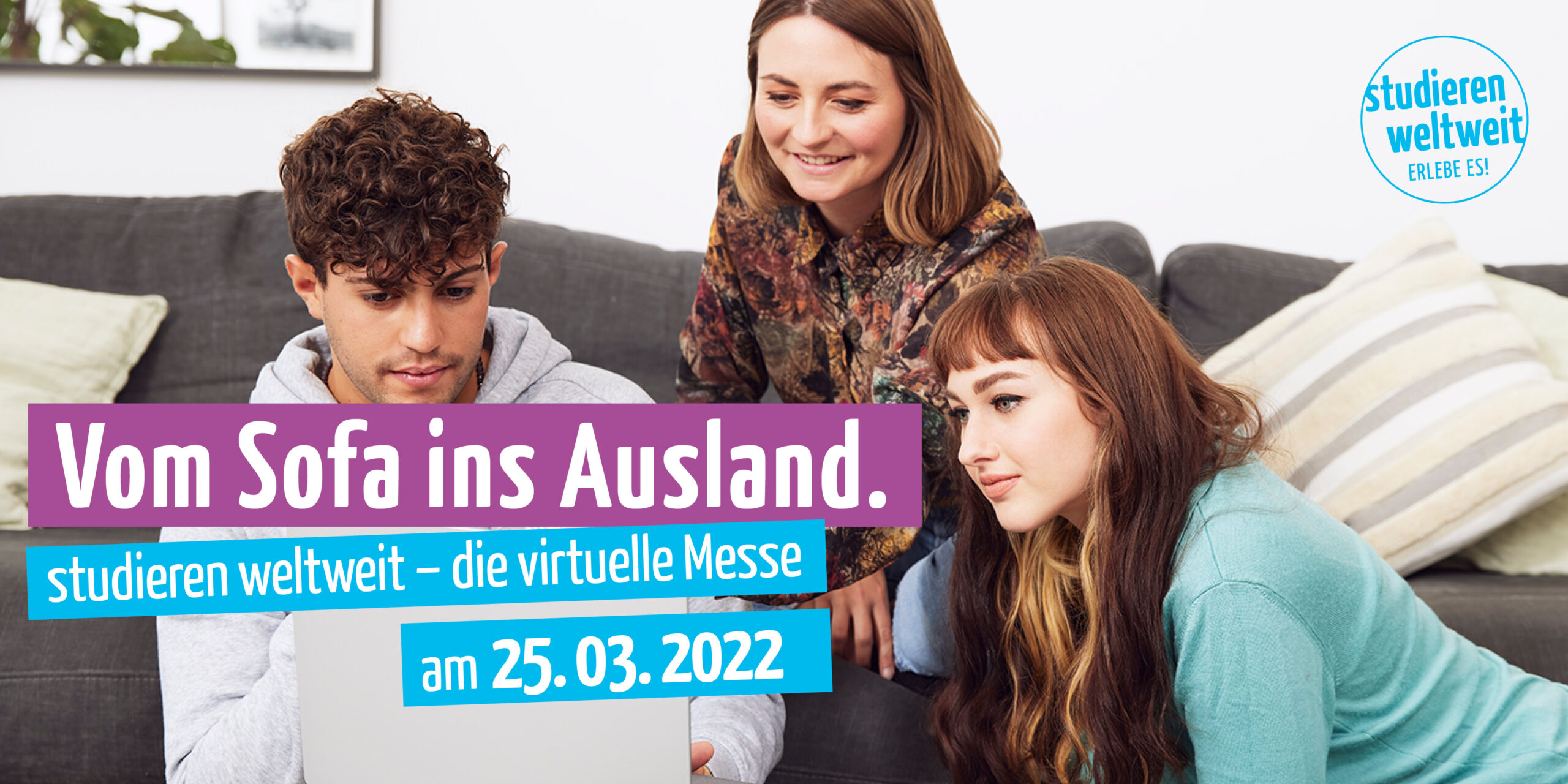
Copyright: Deutscher Akademischer Austauschdienst e.V. (DAAD)
The online fair “Studying worldwide – the virtual fair” will take place again this year. On March 25, 2022, students can get personal advice on studying or doing internships abroad. There will also be a wide-ranging program on financing options and recommended planning steps. Testimonials from former exchange students will give you personal insights that could be valuable for your own planning process.
- When? March 25, 2022, from 12:30pm to 4:30pm.
- Where? Online.
For more information and to register for free, visit the “Studying Worldwide” exhibition page.
Review of the 150th anniversary exhibition of the RWTH
From October 30, 2021 to February 13, 2022, the 150th anniversary exhibition of the RWTH took place at the Centre de Charlemagne in Aachen. ISEA – the Institute for Power Electronics and Electrical Drives – also contributed with some exhibits to illustrate the highlights from research and the development of RWTH since its foundation in October 1870.
For all those who could not be there and see this wonderful exhibition for themselves, we have a short review.
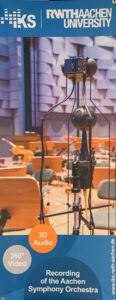
Among others, the IKS was also involved. The project “Virtual visit” dealt with the 3D telephony of the future: Who hasn’t had the wish to beam to the other side while talking on the phone? At least via audio, this would be possible in the future; for example, one could already sit virtually in the middle of a concert of the Aachen Symphony Orchestra.
Prof. Dr. Peter Jax presented the state of the art as well as current research topics in his lecture and invited to an exciting discussion afterwards.
It was very interesting to get to know a current research project of the IKS and to experience the research live.
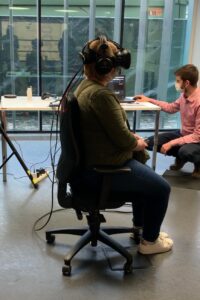
The content of the lecture was further illustrated in the exhibition by virtually sitting in the middle of the concert of the Aachen Symphony Orchestra. The aim was to perceive the sound in 3 dimensions. To experience this phenomenon, all one had to do was put on a pair of virtual reality glasses and enjoy the sounds of the Aachen Symphony Orchestra.
It was particularly fascinating to be able to hear the sounds from all directions and at the same time to be able to identify the direction from which they came. It was easy to follow the sounds more closely by turning around to look at them with the glasses. It was really a great insight into the research of the IKS.
The Future of Networking
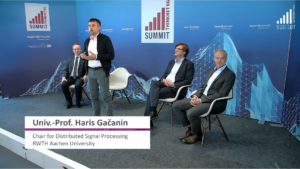 Professor Dr. Haris Gačanin, head of the Chair for Distributed Signal Processing and co-director of the Institute of Communication Technologies and Embedded Systems, presented the research activities of the 6GEM Research Hub at the Thinknet 6G Summit. The Thinknet 6G Summit is an international conference focused on the next generation of communication networks.
Professor Dr. Haris Gačanin, head of the Chair for Distributed Signal Processing and co-director of the Institute of Communication Technologies and Embedded Systems, presented the research activities of the 6GEM Research Hub at the Thinknet 6G Summit. The Thinknet 6G Summit is an international conference focused on the next generation of communication networks.
As digitalization progresses, mobile communications communication takes on the crucial role of providing the communication infrastructure for society as a whole. The current generation of mobile communication, 5G, is the first to shift focus away from individual end-user communications to industrial applications (Industry 4.0), logistics, transportation and eHealth. The subsequent generation, 6G, is expected to further expand network capacity and speed to enable applications with significantly higher connectivity requirements, such as fully autonomous driving.
In this regard, the 6GEM Research Hub is focusing more on the practical impact that 6G will have on our society. After all, this advanced infrastructure must provide adaptive and resilient communication systemss for a wide range of requirements and applications for the benefit of humanity.
Verleihung der Friedrich-Wilhelm-Preise 2021/ Award of the Friedrich Wilhelm Prizes 2021
Rayleigh Medal für Professor Michael Vorländer/ Rayleigh Medal for Professor Michael Vorländer
The Institute of Hearing Technology and Acoustics is proud to announce that Professor Michael Vorländer has recently been awarded the prestigious Rayleigh Medal, the highest award of the Institute of Acoustics. Therefore, we from the Faculty of Electrical Engineering and Information Technology also say, congratulations!
The Rayleigh Medal is the highest award of the Institute of Acoustics and is given without regard to age to individuals who have made outstanding contributions to acoustics. The medal is named for John William Strutt, Third Baron Rayleigh (1842-1919), a highly versatile physicist who conducted both experimental and theoretical research in virtually all areas of the field. His book The Theory of Sound remains a landmark in the development of acoustics.
With this award, Michael joins a list of very well-known acousticians such as Manfred Schröder, Hugo Fastl, Leo Beranek, and his predecessor Heinrich Kuttruff who have also been awarded this medal.
(Deutsch) Lernen. Forschen. Machen. – Der Digitale Alumni Tag 2021
RWTH student team AixSense successful in international SensUs competition
The Faculty of Electrical Engineering and Information Technology warmly congratulates students Daniyar Kizatov, Jiayi He, Anshul Prashar and Shunjiro Sodei and all involved on their successful second place in the international Biosensor Competition SensUs! The fourth generation of the RWTH Aachen student team AixSense participated in the SensUs competition at Eindhoven University of Technology this year.
Consisting of four ambitious students from the fields of Computer Engineering and Micro-Nano-Electronics, the interdisciplinary team has spent the past six months developing a prototype biosensor to detect the influenza A virus. Thus, the team worked in the laboratories and clean rooms of our Institute of Materials in Electrical Engineering 1 at RWTH, where the chips (see picture on the right) were produced as key components for the technology. The team was supervised by Prof. Sven Ingebrandt and Dr. Vivek Pachauri.
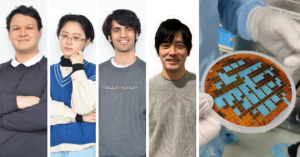
Daniyar Kizatov, Jiayi He, Anshul Prashar, Shunjiro Sodei | Copyright: IWE1
At the final event, the AixSense team presented the biosensor prototype and was awarded in four categories for analytical performance, creativity, transferability of the concept and public inspiration. In the Analytical Performance category, RWTH Aachen University took second place by a slight margin.
“Our team was never so close to winning one of the most important awards. It was very close and we are proud of our performance.”
– Daniyar Kizatov, team leader of AixSense
This year, 14 student teams from Denmark, Egypt, the Netherlands, Germany, Portugal, Switzerland, China, Sweden, the USA, Belgium, the UK, Canada and Spain took part in the competition.
The biosensor has been known to the public at the latest since the introduction of the Covid rapid test – but the SensUs community has been supporting young scientists to present their research in the field of biosensors internationally for five years. Every year, a new generation of teams faces the challenge of developing a biosensor prototype for a new disease. So far, the focus has been on detecting biomarkers for kidney failure, heart failure, antibiotic resistance, rheumatism and epilepsy.
Next year, the SensUs competition aims to detect cytokines as crucial proteins in the immune system. The application phase for the next generation of the AixSense team starts in December 2021 – more information on how to apply can be found here.
(Original article press release IWE1)



